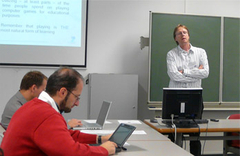| 
|
Based on the successful
experience form the 1st STEG, a one-day workshop will
be organised in conjunction with the International
Conference on Web-based Learning (ICWL) 2009 in Aachen
(Germany) between 19-21 August 2009.
The work shop will cover
a wide range of research issues about story-telling
and educational games including story and game design
paradigms, Web 2.0 based story-telling and gaming
scenarios, advanced story-telling and educational
gaming technologies and platforms for technology enhanced
learning. It aims at a state-of-the-art discussion
on advanced research and open issues on story-telling
and educational gaming among multimedia communities,
with special focus on how both approaches can be combined.
Workshop topics
-
Story-telling and
game theories
-
Story and game design
paradigms for Web-based Learning
-
Augmented story-telling
and gaming
-
Story-telling and
educational gaming with social software
-
Story-telling and
educational gaming with mobile technologies
-
Cross-media/transmedia
story-telling and gaming
-
Computer gaming
for story-telling
-
Multimedia story
and game authoring
-
Story-telling and
educational gaming applications
|
Background and Rationale
Already in 2008 the full day workshop on Story-Telling and
Educational Gaming (1st STEG) took place successfully bringing
together researchers of story-telling and gaming domains from
all over the world, triggering fruitful discussions and producing
interesting publications. The information on the last year
event can be found on the workshop web site under http://www.prolearn-academy.org/Events/steg08.
One selected publication on "Gaming between Real and
Virtual Life" was accepted to International Journal on
TEL. This positive experience can serve as an evidence for
the importance of the workshop topic in the modern research
world. To reinforce the motivation based on the success of
1st STEG the background and rationale of the workshops area
will be described.
Stories and story-telling are cultural achievements
of significant relevance even in modern times. Nowadays, story-telling
is being enhanced with the convergence of sociology, pedagogy,
and technology. In recent times, computer gaming has also
been deployed for educational purposes and has proved to be
an effective approach to mental stimulation and intelligence
development. Many conceptual similarities and some procedural
correlation exist between story-telling and educational gaming.
Therefore these two areas can be clubbed for research on Technology
Enhanced Learning (TEL). Many facets of story-telling and
educational gaming emulate real life processes, which can
be represented either as complex story graphs or as interleaved
sub-problems. This model is congruent with that used for Technology
Enhanced Learning in vocational training. TEL in vocational
training requires learning models that focus more on the process
and less on the content.
The main difference between educational games
and story-telling lies in the user's motivational point of
view. Story-telling aims at reliving real life tasks and capturing
previous experiences in problem-solving for reuse, while educational
games reproduce real life tasks in a virtual world in an (ideally)
engaging and attractive process. Nevertheless, educational
games require highly specialized technical and pedagogical
skills and learning processes to cover the topics in sufficient
depth and breadth. Imbalance between depth and breadth of
study can lead to producing trivial games, which in turn can
lead to de-motivating the learner.
While the integration of learning and gaming
provides a great opportunity, several motivational challenges
(particularly in vocational training) must also be addressed
to ensure successful realization. Non-linear digital stories
are an ideal starting point for the creation of educational
games, since each story addresses a certain problem, so that
the story recipient can gain benefit from other users' experiences.
This leads to the development of more realistic stories, which
then provide the kernel for developing non-trivial educational
videogames. These stories can cover the instructional portion
of an educational game, while the game would add the motivation
and engagement part.
In summary, this workshop aims at bringing
together researchers, experts and practitioners from the domains
of non-linear digital interactive story-telling and educational
gaming to share ideas and knowledge. There is a great amount
of separate research in these two fields and the celebration
of this workshop will allow the participants to discover and
leverage potential synergies.
Organisers
Yiwei Cao, RWTH Aachen University, Germany
Stefan Göbel, TU Darmstadt, Germany
Anna Hannemann, RWTH Aachen University, Germany
Cord Hockemeyer, University of Graz, Austria
Baltasar Fernández Manjón, Complutense University,
Spain
Emmanuel Stefanakis, Harokopio University of Athen, Greece
Program Committee
Amanda Gower (British Telecommunications plc, UK)
Anna Hannemann (RWTH Aachen University, Aachen, Germany)
Bailing Zhang (Victoria University, Melbourne, Australia)
Baltasar Fernández Manjón (Complutense University
of Madrid, Madrid, Spain)
Carlos Delgado Kloos (Carlos III University, Spain)
Carsten Ullrich (Shanghai Jiaotong University, Shanghai, China)
Christian Guetl (Institute for Information Systems and Computer
Media (IICM), Graz University of Technology, Austria)
Cord Hockemeyer (University of Graz, Graz, Austria)
Emmanuel Stefanakis (Harokopio University of Athen, Athen,
Greece)
Georg Thallinger (Joanneum Research, Graz, Austria)
Harald Kosch (University of Passau, Germany)
Jose Luis Sierra (Complutense University of Madrid, Madrid,
Spain)
Manuel Fradinho (Cyntelix, Ireland)
Marc Spaniol (MPI, Saarbruecken, Germany)
Mathias Lux (Klagenfurt University, Austria)
Michael Granitzer (Know Center, Graz, Austria)
Michael Hausenblas (DERI, National University of Ireland,
Galway, Ireland)
Michael D. Kickmeier-Rust (University of Graz, Graz, Austria)
Nalin Sharda (Victoria University, Melbourne, Australia)
Pablo Moreno-Ger (Complutense University of Madrid, Madrid,
Spain)
Ralf Klamma (RWTH Aachen University, Aachen, Germany)
Romulus Grigoras (ENSEEIHT, France)
Ronan Champagnat (La Rochelle University, La Rachelle, France)
Stamatia Dasiopoulou (ITI Thessaloniki, Greece)
Stefan Göbel (TU Darmstadt, Darmstadt, Germany)
Stephan Lukosch (TU Delft, Delft, The Netherlands)
Vincent Charvillat (ENSEEIHT, France)
Werner Bailer (Joanneum Research, Graz, Austria)
Wolfgang Gräther (Fraunhofer FIT, St. Augustin, Germany)
Yiwei Cao (RWTH Aachen University, Aachen, Germany)
|



